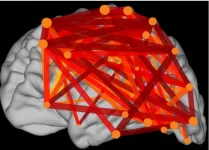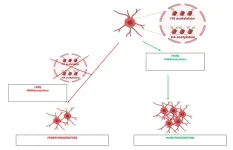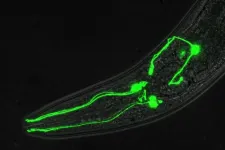(Press-News.org) Researchers at the University of Maryland genetically modified poplar trees to produce high-performance, structural wood without the use of chemicals or energy intensive processing. Made from traditional wood, Engineered wood is often seen as a renewable replacement for traditional building materials like steel, cement, glass and plastic. It also has the potential to store carbon for a longer time than traditional wood because it can resist deterioration, making it useful in efforts to reduce carbon emissions.
But the hurdle to true sustainability in engineered wood is that it requires processing with volatile chemicals and a significant amount of energy, and produces considerable waste. The researchers edited one gene in live poplar trees, which then grew wood ready for engineering without processing.
The research was published online on August 12, 2024, in the Journal Matter.
“We are very excited to demonstrate an innovative approach that combines genetic engineering and wood engineering, to sustainably sequester and store carbon in a resilient super wood form, said Yiping Qi, a professor in the Department of Plant Science and Landscape Architecture at UMD and a corresponding author of the study, “Carbon sequestration is critical in our fight against climate change, and such engineered wood may find many uses in the future bioeconomy.”
Before wood can be treated to impart structural properties such as increased strength or UV resistance, which allows it to be substituted for steel or concrete, it must be stripped of one of its main components, called lignin.
Previously, UMD researchers successfully developed methods for removing lignin using various chemicals, and others have explored the use of enzymes and microwave technology. With this new research, Qi and his colleagues sought to develop a method that does not rely on chemicals, produce chemical wastes or rely on large amounts of energy.
Using a technology called base editing to knock out a key gene called 4CL1, the researchers were able to grow poplars with 12.8% lower lignin content than wild-type poplar trees. This is comparable to the chemical treatments used in processing engineered wood products.
Qi and his collaborators grew their knock-out trees side by side with unmodified trees in a greenhouse for six months. They observed no difference in growth rates and no significant differences in structure between the modified and unmodified trees.
To test the viability of their genetically modified poplar, the team, led by professor of materials science and engineering, Liangbing Hu, used it to produce small samples of high-strength compressed wood similar to particle board, which is often used in building furniture.
Compressed wood is made by soaking wood in water under a vacuum and then hot-pressing it until it is nearly 1/5 of its original thickness. The process increases the density of the wood fibers. In natural wood, lignin helps cells maintain their structure, and prevents them from being compressed. The lower lignin content of chemically treated or genetically modified wood allows the cells to compress to a higher density, increasing the strength of the final product.
To evaluate the performance of their genetically edited trees the team also produced compressed wood from the natural poplar, using untreated wood and wood that they treated with the traditional chemical process to reduce the lignin content.
They found that the compressed genetically modified poplar performed on a par with the chemically processed natural wood. Both were denser and more than 1.5 times stronger than compressed, untreated, natural wood.
The compressed genetically modified wood had a tensile strength comparable to aluminum alloy 6061 and the compressed wood that had been chemically treated.
This work opens the door to producing a variety of building products in a relatively low-cost, environmentally sustainable way at a scale that can play an important role in the battle against climate change.
-----
The research paper, “Genome-edited Trees for High-Performance Engineered Wood” was published in the October 2, 2024, issue of the journal Matter.
This research was conducted in collaboration with colleagues from UMD’s Department of Materials Science and Engineering, National Institute of Standards and Technology Center for Neutron Research, U.S. Department of Agriculture, Forest Service, Forest Products Laboratory, Department of Biological Systems Engineering University of Wisconsin-Madison, and Institute for Bioscience and Biotechnology Research.
END
New genetically engineered wood can store carbon and reduce emissions
UMD researchers edited poplar tree genes to produce chemical-free, sustainable structural wood products
2024-08-12
ELSE PRESS RELEASES FROM THIS DATE:
NK cells expressing interleukin-21 show promising antitumor activity in glioblastoma cells
2024-08-12
Natural killer (NK) cells engineered to express interleukin-21 (IL-21) demonstrated sustained antitumor activity against glioblastoma stem cell-like cells (GSCs) both in vitro and in vivo, according to new research from The University of Texas MD Anderson Cancer Center.
The preclinical findings, published today in Cancer Cell, represent the first evidence that engineering NK cells, a type of innate immune cell, to secrete IL-21 resulted in strong activity against glioblastoma, a cancer type in need of more effective treatment options.
“Our ...
Strong insurance laws help kids get access to mental health care
2024-08-12
When states require insurers to cover mental and behavioral health, children get better access to care, according to a UC San Francisco-led study of nearly 30,000 U.S. caregivers.
They found that 1 in 8 caregivers had difficulty accessing mental health services for their children between 2016 and 2019. But those who lived in states with the most comprehensive mental and behavioral health coverage laws were about 20% less likely to report trouble accessing care than those who lived in states with the least comprehensive laws.
Caregivers of Black and Asian children were more likely to report poor access to mental and ...
State-of-the-art brain recordings reveal how neurons resonate
2024-08-12
For decades, scientists have focused on how the brain processes information in a hierarchical manner, with different brain areas specialized for different tasks. However, how these areas communicate and integrate information to form a coherent whole has remained a mystery. Now, researchers at University of California San Diego School of Medicine have brought us closer to solving it by observing how neurons synchronize across the human brain while reading. The findings are published in Nature Human Behavior and are also the basis of a thesis by UC San Diego School of Medicine doctoral candidate Jacob Garrett.
“How the activity of the brain relates to the subjective ...
New study reveals unique histone tag in adult oligodendrocyte progenitor cells, opening doors for advanced myelin repair therapies
2024-08-12
NEW YORK, August 12, 2024 — In a groundbreaking study, researchers with the Advanced Science Research Center at the CUNY Graduate Center (CUNY ASRC) have identified a distinct histone tag in adult oligodendrocyte progenitor cells (OPCs) that may pave the way for innovative therapies targeting myelin repair, a critical target for several neurodegenerative and psychiatric disorders, including multiple sclerosis, Alzheimer’s disease, and schizophrenia. The histone tag, characterized by lysine 8 acetylation on histone H4, identifies a significant departure from the histone modifications found in neonatal OPCs.
Detailed in a ...
SwRI launches Electrified Vehicle and Energy Storage Evaluation-II battery consortium
2024-08-12
SAN ANTONIO — August 12, 2024 – Southwest Research Institute (SwRI) is launching the next phase of an electric vehicle (EV) battery consortium dedicated to understanding performance of energy storage systems. The Electrified Vehicle and Energy Storage Evaluation-II (EVESE-II) consortium builds on more than a decade of SwRI-led, precompetitive research with companies across the mobility sector.
“We are proud to serve the EV industry by bringing together manufacturers, suppliers and battery designers and developers with materials scientists to address a variety of challenges,” said Dr. Andre Swarts, an SwRI staff engineer ...
Possible explanation for link between diabetes and Alzheimer's
2024-08-12
People with type 2 diabetes are at increased risk of Alzheimer's disease and other cognitive problems. A new study led by Umeå University, Sweden, shows that the reason may be that people with type 2 diabetes have more difficulty getting rid of a protein that may cause the disease.
"The results may be important for further research into possible treatments to counteract the risk of people with type 2 diabetes being affected by Alzheimer's," says Olov Rolandsson, senior professor at the Department of Public Health and Clinical Medicine at Umeå University, research leader and first author of the study.
The substances ...
Surf spots are global ally in climate fight, study finds
2024-08-12
Surf Spots are Global Ally in Climate Fight, Study Finds
Nearly 90 million metric tonnes of planet-warming carbon found surrounding surf breaks across the world; U.S., Australia, Indonesia, Brazil identified as conservation priorities
ARLINGTON, Va. (Aug. 12, 2024) – A first-of-its-kind study, published today in Conservation Science and Practice, has found that the forests, mangroves and marshes surrounding surf breaks store almost 90 Mt (million metric tonnes) of climate-stabilizing “irrecoverable carbon,” making these coastal locations ...
Taking a ‘one in a million’ shot to tackle dopamine-linked brain disorders
2024-08-12
Dopamine, a powerful brain chemical and neurotransmitter, is a key regulator of many important functions such as attention, experiencing pleasure and reward, and coordinating movement. The brain tightly regulates the production, release, inactivation and signaling of dopamine via a host of genes whose identity and link to human disease continue to expand.
Brain disorders associated with altered dopamine signaling include substance use disorder, attention deficit hyperactivity disorder (ADHD), autism, bipolar disorder, schizophrenia and Parkinson’s disease. The complexity of the human brain and its ...
Just say “climate change” – not “climate emergency”
2024-08-12
The terms “climate change” and “global warming” are not only more familiar to people than some of their most common synonyms, but they also generate more concern about the warming of the Earth, according to a USC study published today in the journal Climatic Change.
The study began by looking at how familiar people are with the terms “global warming,” “climate change,” “climate crisis,” “climate emergency,” and “climate justice.” ...
Mature forests vital in frontline fight against climate change
2024-08-12
Mature forests have a key role to play in the fight against climate change – extracting carbon dioxide (CO2) from the atmosphere and locking it into new wood, a new study reveals.
Researchers discovered that older trees responded to increased atmospheric levels of CO2 by increasing production of woody biomass – countering existing theories that mature woodland has no capacity to respond to elevated CO2 levels.
The experts found exposure to elevated levels of the greenhouse gas (ambient ...
LAST 30 PRESS RELEASES:
SfN announces Early Career Policy Ambassadors Class of 2026
Spiritual practices strongly associated with reduced risk for hazardous alcohol and drug use
Novel vaccine protects against C. diff disease and recurrence
An “electrical” circadian clock balances growth between shoots and roots
Largest study of rare skin cancer in Mexican patients shows its more complex than previously thought
Colonists dredged away Sydney’s natural oyster reefs. Now science knows how best to restore them.
Joint and independent associations of gestational diabetes and depression with childhood obesity
Spirituality and harmful or hazardous alcohol and other drug use
New plastic material could solve energy storage challenge, researchers report
Mapping protein production in brain cells yields new insights for brain disease
Exposing a hidden anchor for HIV replication
Can Europe be climate-neutral by 2050? New monitor tracks the pace of the energy transition
Major heart attack study reveals ‘survival paradox’: Frail men at higher risk of death than women despite better treatment
Medicare patients get different stroke care depending on plan, analysis reveals
Polyploidy-induced senescence may drive aging, tissue repair, and cancer risk
Study shows that treating patients with lifestyle medicine may help reduce clinician burnout
Experimental and numerical framework for acoustic streaming prediction in mid-air phased arrays
Ancestral motif enables broad DNA binding by NIN, a master regulator of rhizobial symbiosis
Macrophage immune cells need constant reminders to retain memories of prior infections
Ultra-endurance running may accelerate aging and breakdown of red blood cells
Ancient mind-body practice proven to lower blood pressure in clinical trial
SwRI to create advanced Product Lifecycle Management system for the Air Force
Natural selection operates on multiple levels, comprehensive review of scientific studies shows
Developing a national research program on liquid metals for fusion
AI-powered ECG could help guide lifelong heart monitoring for patients with repaired tetralogy of fallot
Global shark bites return to average in 2025, with a smaller proportion in the United States
Millions are unaware of heart risks that don’t start in the heart
What freezing plants in blocks of ice can tell us about the future of Svalbard’s plant communities
A new vascularized tissueoid-on-a-chip model for liver regeneration and transplant rejection
Augmented reality menus may help restaurants attract more customers, improve brand perceptions
[Press-News.org] New genetically engineered wood can store carbon and reduce emissionsUMD researchers edited poplar tree genes to produce chemical-free, sustainable structural wood products






